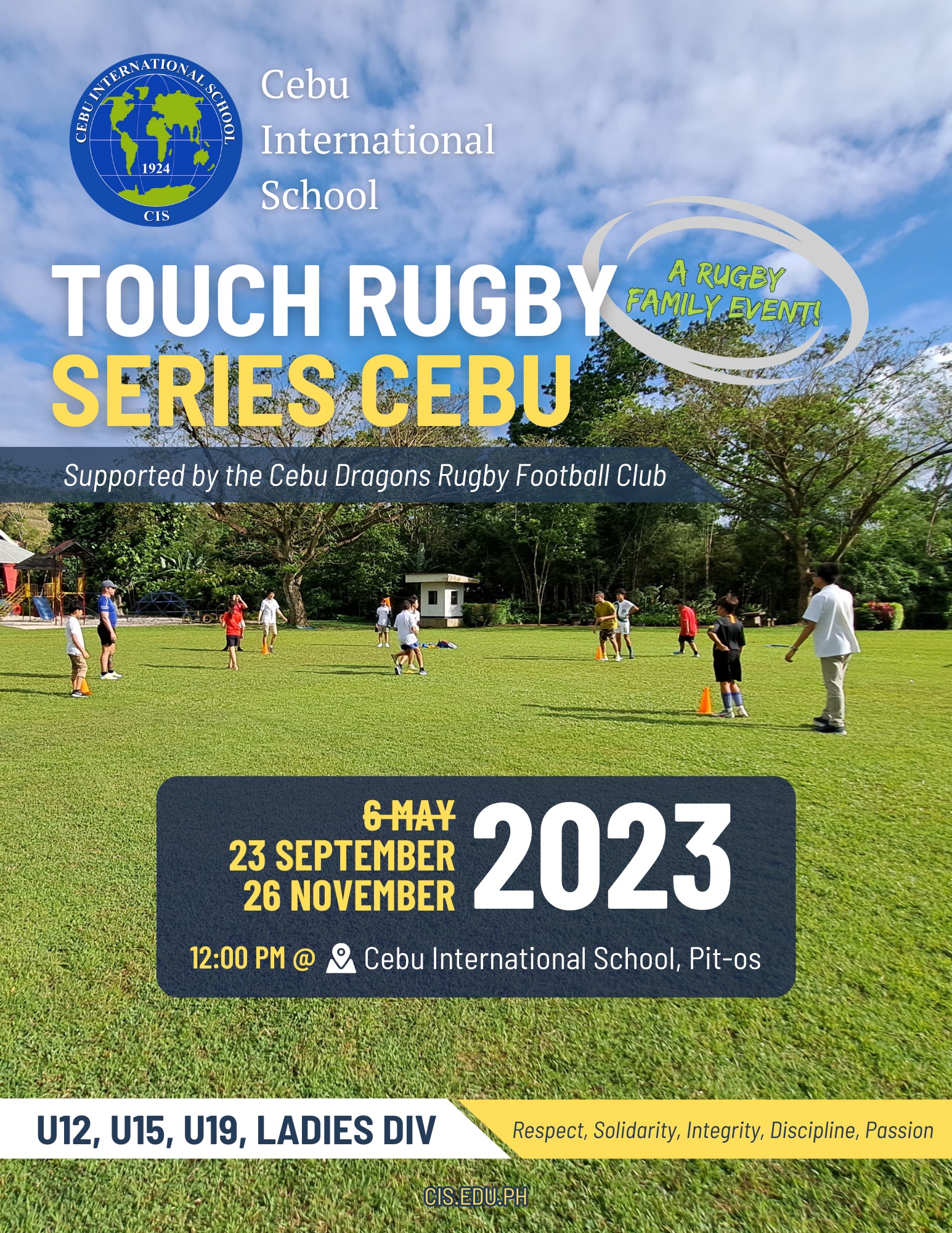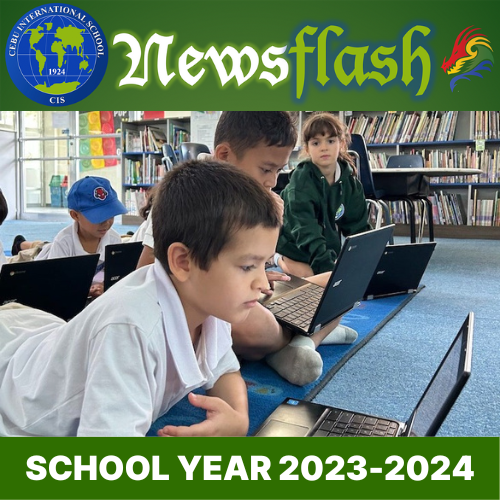
MHS Principal’s Corner
by Mr. Benjamin Martin, MHS Principal
Does the Early Bird Really Catch the Worm?
Many of us have heard the popular phrase that “the early bird catches the 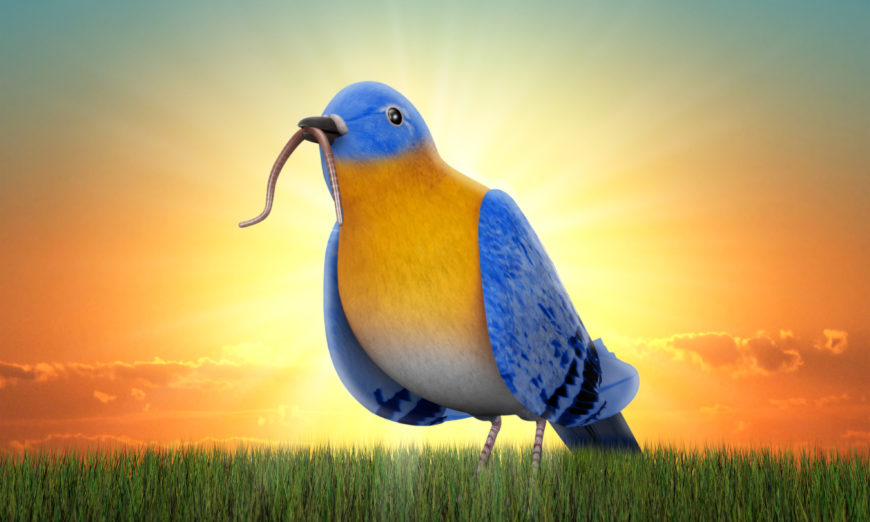 worm” and have been told that waking up earlier will lead to more productivity. But what does the data show? Is this actually true? In fact, in addition to the research that highlights that students who attend their classes having an advantage over their peers who miss classes, (Gershenson et al., 2017; Kirksey, 2019; Klein et al., 2022), the results are quite clear that these “early bird” students do in fact have an advantage down the line.
worm” and have been told that waking up earlier will lead to more productivity. But what does the data show? Is this actually true? In fact, in addition to the research that highlights that students who attend their classes having an advantage over their peers who miss classes, (Gershenson et al., 2017; Kirksey, 2019; Klein et al., 2022), the results are quite clear that these “early bird” students do in fact have an advantage down the line.
We see this firsthand with our own students on their report card grades and with their performances on their IB exams. But our internal data also aligns with the studies that have shown that students who wake up earlier have higher scores in university and this is aligned with the data that shows that people who wake up early have a higher average salary and better mental health.
We know that waking up early is not easy. It is difficult for all of us and because of the sleep cycles of adolescents, ideally school could start later for them (and for us educators!). Unfortunately, we also know that most companies need their employees at work earlier and that most children would be unsupervised at home or not have the transportation they need so most schools must start early in the morning. We know that by living in Asia, large populations are a given and many people means many people commuting, which leads to traffic congestion, which means an even earlier start to the day. I have previously lived and worked in Seoul, Ho Chi Minh, and Bangkok and had long commuting times.
However, waking up earlier is possible for us to do and forming these habits will lead to future success over time for our students. We appreciate your assistance in making sure that your child wakes up early and has the transportation they need to arrive just after 7:00 am so they are fully awake and ready to learn at 7:30 am. As the data proves, this will result in better scores and better health. It isn’t easy to be an “early bird” but it does make a difference in putting ourselves in the best positions possible to be more successful, happier, and healthier!
Upcoming events of note
- Sept 15: HAD1: AM only / Faculty in service day (PM) – no classes in PM
- Sep 19: CIS Annual General Membership Corporation Meeting
- Sep 29-30: MUN Locals
- Oct 2 – 6: October break (School holiday)
Please refer to the CIS Event Calendar for the complete calendar of school events.
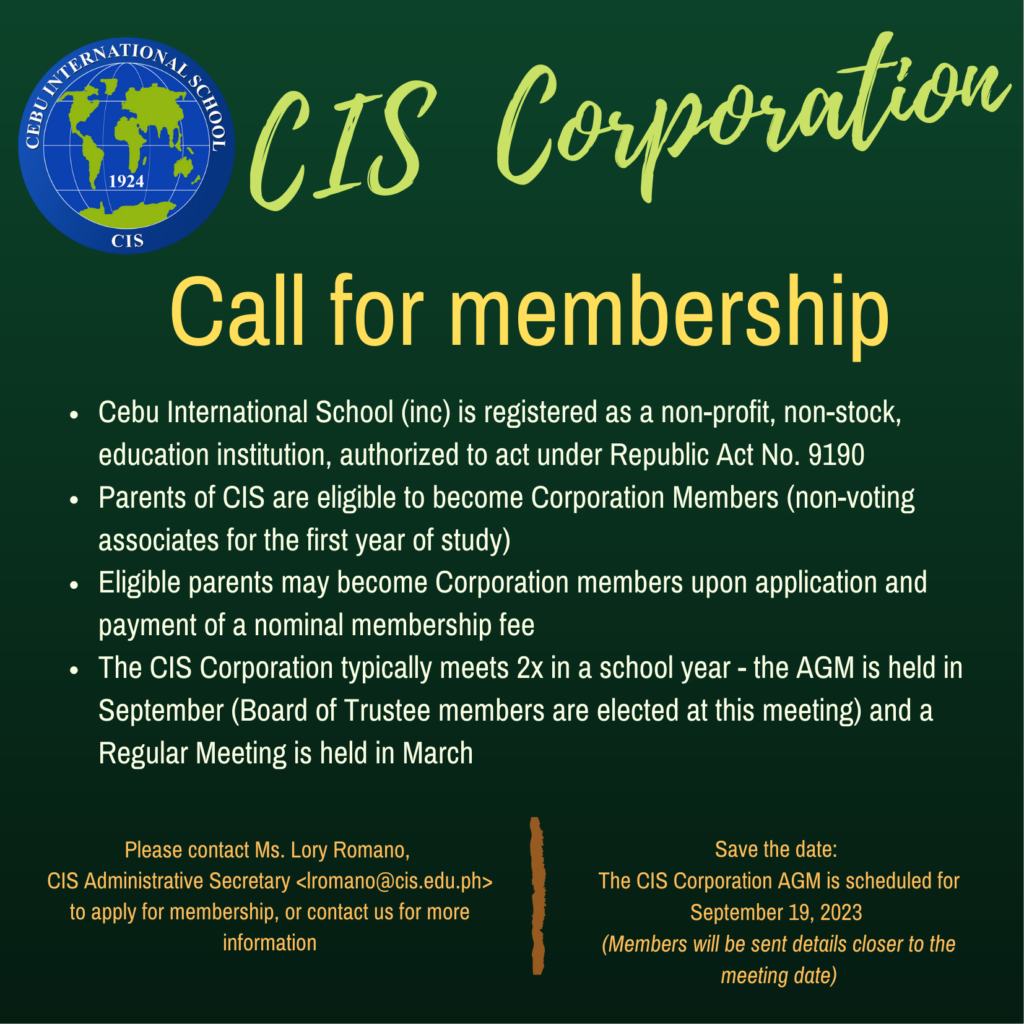
Early Years
by Ms. Aimee Valenzona, Early Years Teacher
Empowering Students: Co-Creating Classroom Routines and Essential Agreements
In the Early Years, we explored the concept of routines and their significance in our daily lives. We seized the opportunity to explore the meaning of the word “routine” and encouraged our students to reflect on the similarities and differences between their home and school routines.
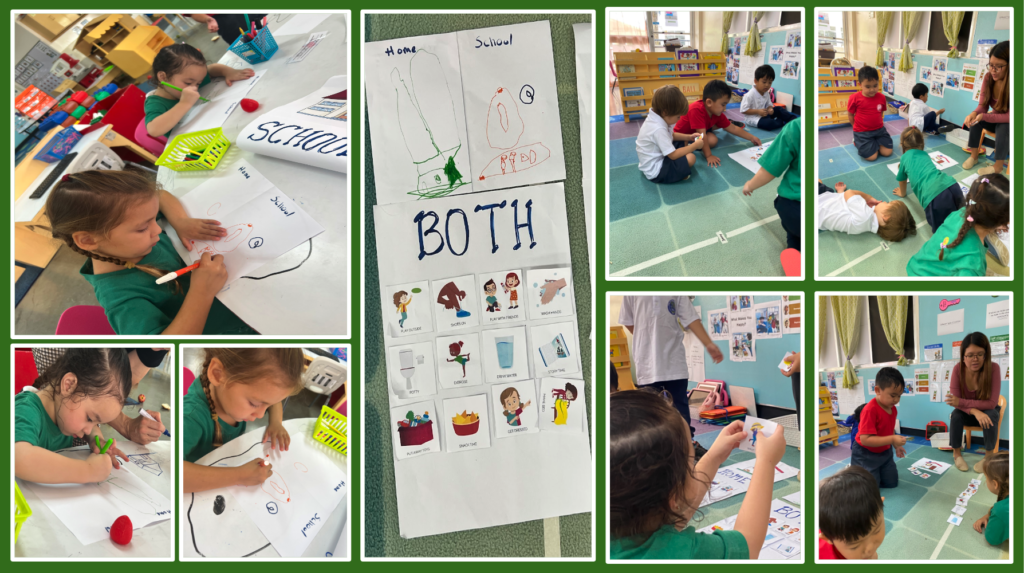
Together as a class, we expanded our list of routines by adding more examples. The students actively participated in this process, sharing their own experiences and insights. To further deepen their understanding, we engaged in a sorting activity where we categorized these routines into three groups: home routines, school routines, or both. What made this activity truly special was the valuable feedback and opinions shared by our students. They expressed their thoughts on where these routines are established and whether they are applicable at home, in school, or both. This discussion not only fostered critical thinking skills but also empowered our students to take ownership of their own routines.
By reflecting on their daily routines and recognizing the similarities and differences between home and school, our students are developing a greater understanding of the structures that shape their lives. The process of reflecting and categorizing these routines is helping them build a sense of ownership and agency over their routines, empowering them to make informed choices and establish positive habits.
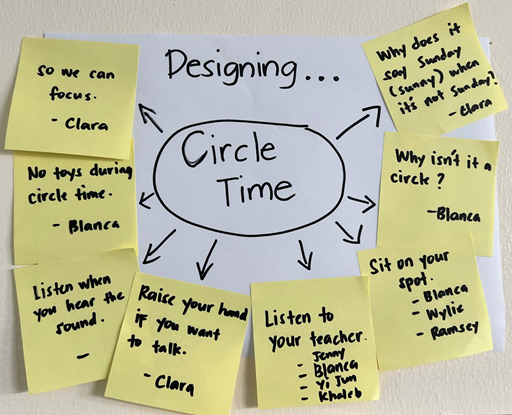 Our students took charge of their learning environment by actively participating in the co-construction of a 3-step circle time routine. In small groups, they collaborated to create a routine that will guide their behavior during circle time. Their enthusiasm and commitment were evident as they even marked their thumbs on an agreement sheet to show their dedication.
Our students took charge of their learning environment by actively participating in the co-construction of a 3-step circle time routine. In small groups, they collaborated to create a routine that will guide their behavior during circle time. Their enthusiasm and commitment were evident as they even marked their thumbs on an agreement sheet to show their dedication.
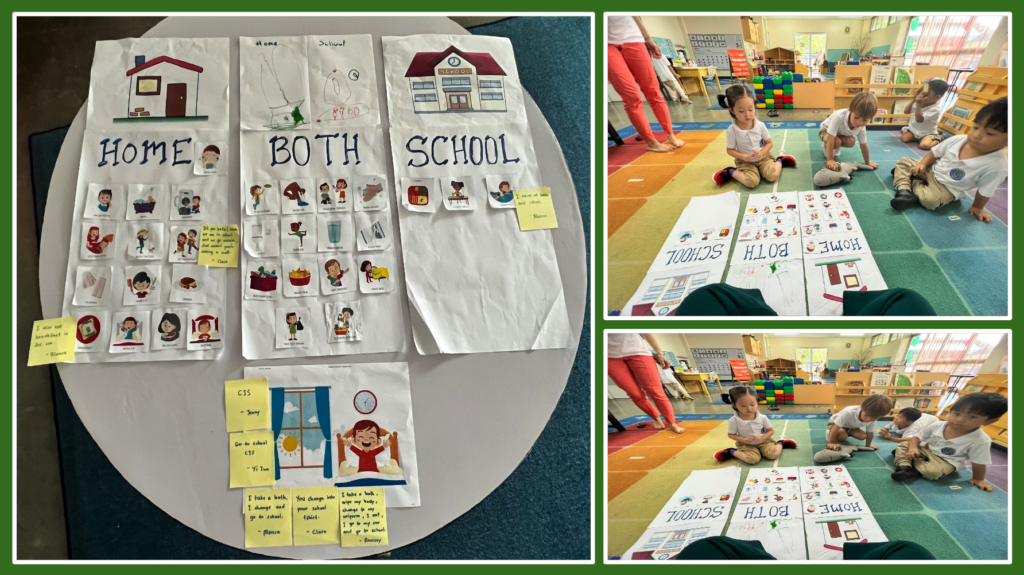
 The 3-step Circle Time Routine
The 3-step Circle Time Routine
- Listen when you hear the sound off to circle time.
- Sit on your name
- Listen to the teacher
But that’s not all! Our students also engaged in meaningful discussions about the essential agreements for circle time. These agreements serve as guidelines for their behavior during this important learning period. Some of our students actively shared their thoughts and ideas during circle time discussions.
Circle Time Essential Agreements
- Play during circle time.
- Put away our toys
- We should raise our hand If we wish to speak
We are thrilled to witness our students taking ownership of their learning environment. By involving them in the decision-making process, we are fostering their independence and promoting a positive classroom culture. This activity not only helps establish routines but also empowers our students to become responsible members of our classroom community. Looking ahead, the Early Years will gradually develop their routines and essential agreements for each of the learning centers in the classroom. Our next focus will be on the Dramatic area and the Classroom Library.
Stay tuned for more exciting updates as we continue to grow and learn together!
Grade 6: MYP Science
by Ms. Haydee Montero, MYP Science Teacher
How does the planet work?
To know how the planet works, the Grade 6 students explored the two important movements: rotation and revolution in relation to how day and night and seasons are experienced on Earth. To do this, a 3D Simulation Model of the Earth, Sun, and Moon was made.
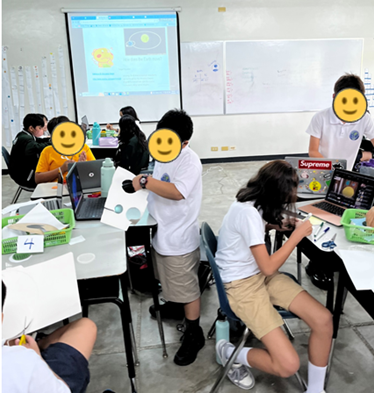
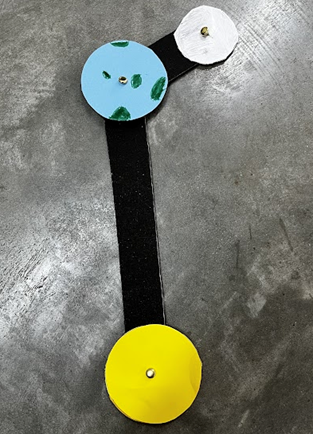
The Earth rotates on its axis every 23.9 hours, defining day and night for people in different parts of the globe. This axis of rotation is tilted 23.4 degrees away from the plane of Earth’s orbit around the sun, giving us seasons. Whichever hemisphere is tilted closer to the sun experiences summer, while the hemisphere tilted away gets winter, as the Earth revolves around the sun. Meanwhile, as the Earth revolves around the Earth, the Moon completes each 27.3-day orbit around the Earth as well. Both Earth and the Moon are moving around the Sun.
Here’s the takeaway for some students from the activity:
Roshan
Dammy
Student Summer Program Experiences
Natalie, Grade 12: Volleyball Summer Camp at the University of Colorado-Boulder
I took part in the volleyball summer camp at The University of Colorado-Boulder during the summer. At CU-Boulder, I registered for six different clinics, including the serving, setting, and bumping clinics. in addition to two three-day high-performance skill camps. We had the opportunity to practice with the entire CU-Boulder volleyball team, and they taught us all the drills they use on campus as well as a lot of advice on how we could enhance our play.
I learned a lot from this entire experience as a student-athlete in CIS. As the volleyball team’s captain and a current senior, this experience has helped me become a better player and leader.
I am going to cherish this experience, and I advise other athletes to challenge themselves to step outside their comfort zone and try something new, particularly if it will help them become better players.
Robert, Grade 12: Engineering Innovation Program at Johns Hopkins
Participating in the Johns Hopkins University’s Engineering Innovation Program has been an unforgettable summer journey. The program has gifted me cherished moments of hands-on discovery and camaraderie.
My favorite memories from the program include the spaghetti bridge building project which was the final project of the whole program. My group won 3rd overall in the whole program when our spaghetti bridge was able to hold 20 kg of weight. Another memory I’ll never forget was seeing the space shuttle discovery, the most decorated of the shuttle fleet.
Through immersive workshops, I honed skills in coding, problem-solving, and prototyping, which I can’t wait to apply in future endeavors. Moreover, the bonds formed with fellow participants turned into enduring friendships, enriching both academic and personal aspects. This experience has not only widened my engineering perspective but also left me with cherished memories and connections that will persist far beyond the summer.
College/Careers Counselor Corner
by Ms. Jenny Basa, College/Careers Counselor Corner
EducationUSA Visit (September 1, 2023)
DATE
Sept 2 Saturday
Sept 3 Sunday
Link to register
11:00AM – 4:00PM (PH time)
Live sessions schedule
List of institutions
Study in Japan Virtual Fair – Chat directly with Admission reps and talk to students in Japan
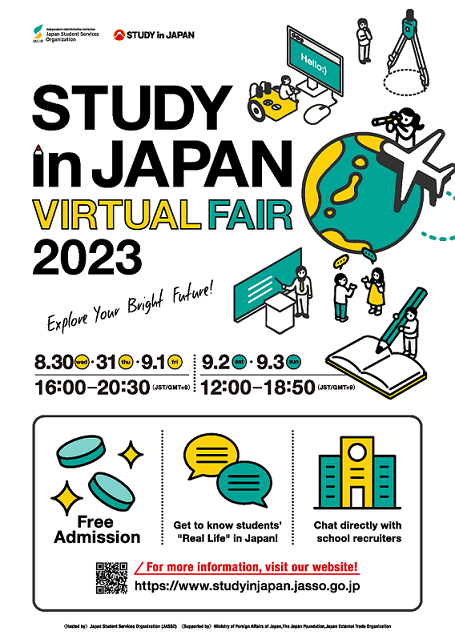
Join us and learn about Brown University, Columbia University, PrincetonUniversity, and the University of Pennsylvania!
Admissions representatives will hold a virtual public information session for students and families about their respective universities and the highly selective college admissions process. Topics will include: academic programs, campus activities, admissions policies, financial aid, and international student life.

September 12
Tuesday
9:00 – 9:40AM
Canteen Annex
Link to sign up
NYU Abu Dhabi – Learn about the NYU experience, application process, programs and scholarship offered from the admissions rep.

September 27
Wednesday
9:00 – 9:40AM
Canteen Annex
Link to sign up
Hong Kong University of Science & Technology – an Info session on the application process, programs and scholarships at HKUST.

September 29
Friday
9:00 – 9:45AM
Canteen Annex
Mini Study in Canada Fair
Study in Canada – Meet with university reps from various institutions from Canada and talk to them about the application process, programs and other offerings.
(List will be published next week)
SAT Update
| Test Date | Deadline for Registration, Changes and Regular Cancellation |
| August 26, 2023 | August 11, 2023 |
| October 7, 2023 | September 22, 2023 |
| December 2, 2023 | November 17, 2023 |
| March 9, 2024 | To be confirmed |
| May 4, 2024 | To be confirmed |
| June 1, 2024 | To be confirmed |
To register for the SAT, you may click on this link. If you need assistance or have any questions, please feel free to email Ms. Jenny Basa at jbasa@cis.edu.ph.
Touch Rugby Series
